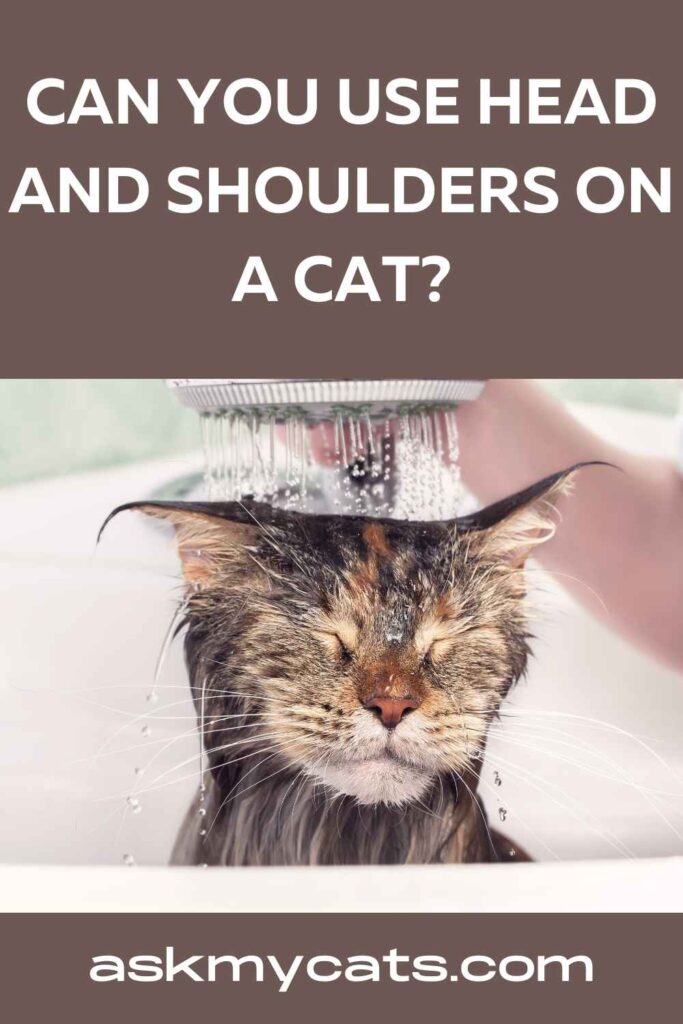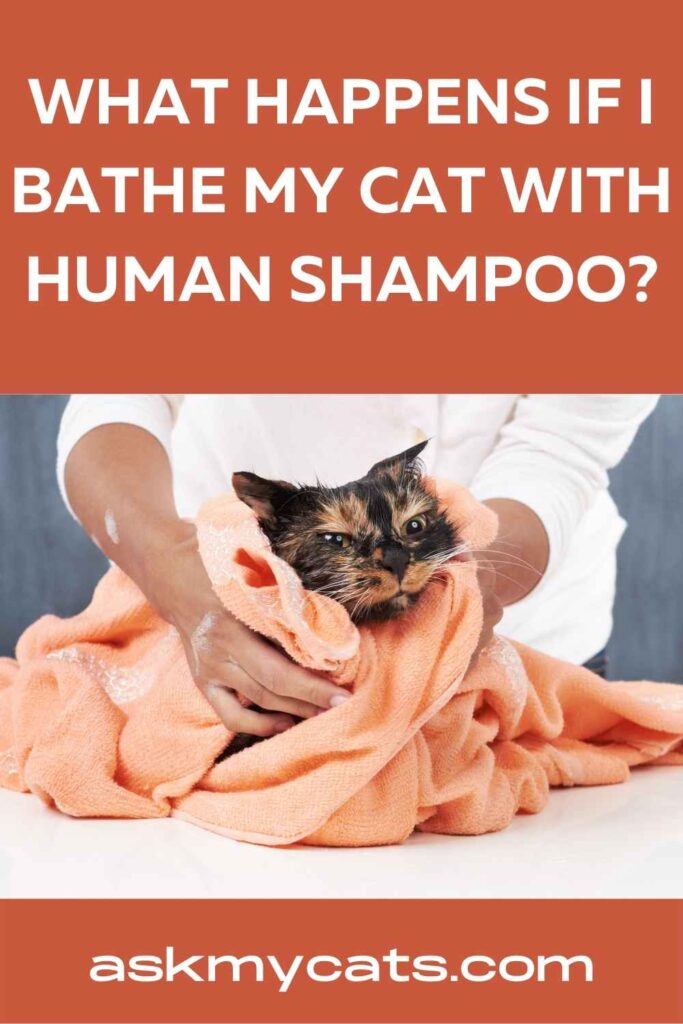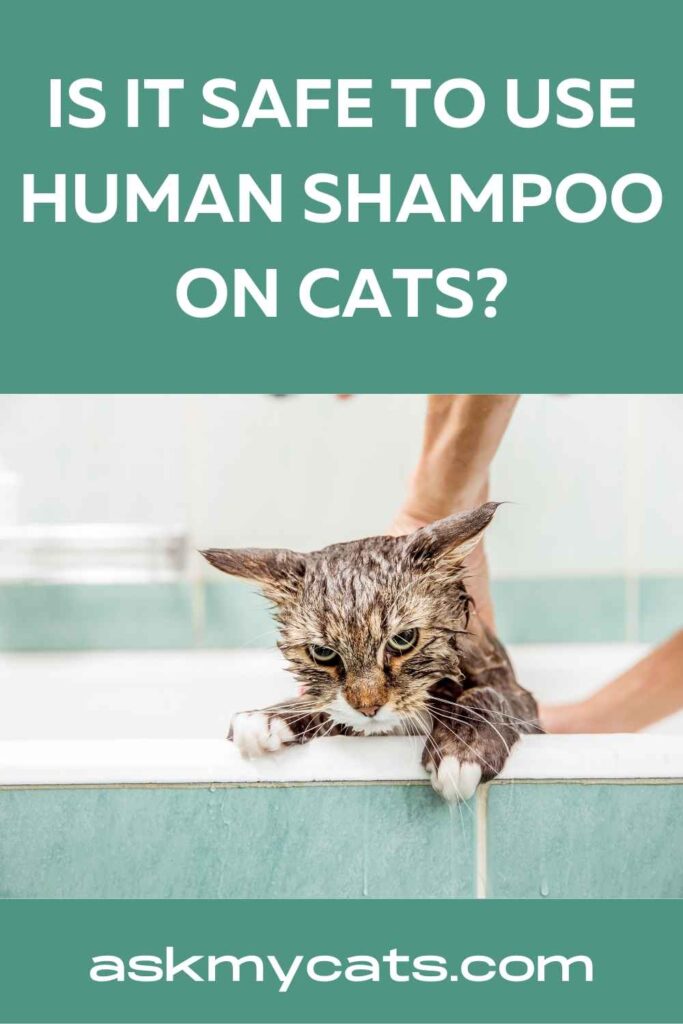Although cats are notoriously clean creatures who spend around five hours per day grooming themselves, they do require assistance from time to time. They may have rolled around in something filthy outside, or they could have gotten into touch with something noxious or deadly.
When this happens, it’s time to bathe your cat, much to their dismay!
But you’d be thinking, “Can I use human shampoo on my cat?” while doing so. The quick answer is no – human shampoo is too acidic for their skin and can cause irritation and dryness.
In this article, I’ll go over why it’s not a good idea to use human shampoo on cats, what you should do if you have one, and some wonderful cat shampoo alternatives. Bath time may not be your cat’s favorite pastime, but at least you’ll know the items you’re using are safe.


Give Your Cat the Perfect Day
Get the Free Ebook!
Can You Use Head And Shoulders On A Cat?

Cats, like people, may have dandruff, but their case is more complicated; you can’t just give them a shot of Head & Shoulders.
Before you can cure dandruff, you must first figure out what is causing it.
A simple environmental component in your house might be the source of the problem. And moggies are especially vulnerable to dandruff at this time of year.
When we use central heating in our homes, we are removing moisture from the air, which can cause the skin to become dry.
A humidifier can aid in the reintroduction of moisture into the environment. Surprisingly, sunbathing may sometimes be a concern. Sunburn can occur in cats, particularly around the sensitive region of the head. This might result in flaky, dry skin.
Another factor to consider is your diet. Fatty acids are important for your cat’s skin because they keep it wet and prevent it from drying out. Your veterinarian should be able to make dietary recommendations.
In addition to these treatments, a good skin wash for cats is recommended, but see your veterinarian for further information. Human dandruff shampoos should never be used on cats since they are toxic to them.
If you don’t handle this condition right away, your moggie may try to solve it on his own by scratching, which can result in irritated and even bleeding skin. Do not allow it to reach this point.
Dandruff can sometimes be caused by more significant underlying health conditions. Walking dandruff mites, fleas, diabetes, and tapeworm are among them. If the condition does not clear itself promptly, please contact your veterinarian.
Must Read: Do Cats Get Dandruff In Winter?
What Happens If I Bathe My Cat With Human Shampoo?

You might be wondering what to do if you’ve put human shampoo on your cat.
If you’re lucky, bathing your cat with human shampoo won’t create any problems, and you won’t have to be concerned.
This is entirely dependent on the shampoo you used, how drying it was for your cat’s skin, and the substances it included. It might also be determined by your cat’s skin sensitivity.
If you’ve used human shampoo on your cat, though, there are a few things you should do to keep them happy and healthy.
1. Take Them to the Veterinary Clinic
If your cat’s skin is severely irritated and plainly in pain, don’t wait and attempt moisturizing their skin at home.
While this may be useful for moderate irritation, using items on skin that are already irritated may make it worse. Instead, take your cat to the veterinarian and ask for guidance.
If your cat is becoming sluggish, vomiting, or having diarrhea, this might be a sign of poisoning, so take them to a vet right away. When it comes to poisoning, if left untreated, symptoms can quickly worsen, therefore you should seek medical help right away.
2. Look for Irritation and Illness Signs
Always check for indications of skin irritation after using human shampoo on your cat, especially searching for:
- Skin that is dry and flaky
- Skin that is red, painful, or irritable
- Scratching or pain that is worsening
- Hair loss that is excessive or exceptional
- Lethargy, vomiting, or diarrhea are all symptoms of a bacterial infection.
If your cat’s skin is only slightly irritated, you may keep an eye on them and wait for their pH and moisture levels to return to normal. More severe symptoms, on the other hand, will necessitate more assistance.
3. The Skin Ought To be Moisturized
If you notice your cat’s skin is dry after you washed them using human shampoo, you could try moisturizing the skin to help it recover.
Coconut oil is an excellent option as it is a natural lubricant and also has anti-inflammatory properties that can effectively soothe and improve irritated skin. Plus, it also helps to make their coat super shiny! That being said, it should only be used occasionally as everyday use could cause issues.
Another option is to use olive oil. This is great at adding moisture back into dry skin, but it does not have the same anti-inflammatory effects as coconut oil and will not help to reduce irritation. That being said, it is still worth a shot if your cat has reacted badly to the shampoo you used.
Interesting Read: Do Black Cats Have Dandruff?
Is It Safe To Use Human Shampoo On Cats?

Human shampoo should never be used on cats since it is unsuited for cat hair and might dry up their skin. Use a cleaning and deodorizing shampoo developed with natural components in a water bath.
Therefore using, human shampoo on your cat’s skin might cause dryness and irritation since their skin has a different pH than ours. As a result, you may clean their fur yet still end up with a scratching cat.
Try a dry skin and conditioning shampoo for cats with dry skin. Other shampoos to consider depending on the state of your feline friend’s coat are flea or tick control shampoos created particularly for cats, as well as shampoos for shedding and hairballs.
It’s critical not to use flea and tick shampoos intended for dogs on your cat since they can be harmful to their health.
It’s always a good idea for pet owners to read the label of any pet product to make sure it’s safe for their particular type of pet, whether it’s a cat or a dog.
Of course, a shampoo created exclusively for cats is the best and safest option. It’s all right if we don’t have all we need at home. The good news is that you most likely have something at home that can serve as a substitute.
We’ve compiled a list of common home products that may be used in place of cat shampoo. We have lots of alternatives for you, whether you choose a basic straight shampoo substitute or a DIY formula for either conventional or dry shampoo.
Instead, choose one of the choices listed below.
1. Wipes for babies and pets
Pros – We all have baby wipes in our homes. However, because baby wipes can contain a range of substances, we recommend only using Water wipes on cats. Another wonderful option is to use Pet Wipes, which are specially made with pet-friendly materials. These may be used to clean your cat’s coat and remove minor stains or regions where something unpleasant has made its way into their coat.
Con– If you’re going to use wipes, be sure they don’t have any perfumes that might bother your cat’s sensitive skin.
2. DIY oatmeal shampoo
Pros -This easy recipe makes an effective and mild oatmeal shampoo that can help relieve itchy skin. 1 cup of ground oatmeal, 12 cups baking soda, and 4 cups of water are all you need. Pour this mixture over your cat’s fur and rub it in with your fingers until it reaches their skin. Allow for up to five minutes before washing well with warm water.
Con– This recipe calls for a significant amount of baking soda, which you may need to purchase if you aren’t a frequent baker.
3. Castile soap
Pros -Castile soap, which is made from olive oil, is a safe and effective substitute for cat shampoo. It’s soft and naturally moisturizing, so it’s a fantastic option for dry-skinned cats.
Con– Castile soap, which is made from olive oil, is a safe and effective substitute for cat shampoo. It’s soft and naturally moisturizing, so it’s a fantastic option for dry-skinned cats.
What Is The Difference Between Cat Shampoo And Human Shampoo?
Human shampoo is ineffective on cats, necessitating the use of shampoo formulated exclusively for felines and built with their skin in mind. But what’s the difference between cat and human shampoo, and why is it so dangerous to use conventional shampoo on cats?
1. Cats and humans have different skin types
Humans and cats are two distinct species, and while we both have skin, feline skin has quite different qualities than human skin. This implies that the shampoo for your hair hasn’t been made with cats in mind.
2. pH Differences in the Skin
The acidity of the skin is measured by its pH. pH values less than 7 are regarded as acidic on the pH scale, which runs from 0 to 14. The lower the value, the more acidic the material is.
Alkali substances have pH values greater than 7, and the higher the number, the more alkali the material.
The average pH of a human adult’s skin is 5.7, however, it fluctuates from 4 to 6, indicating that it is acidic. Cat skin, on the other hand, has an average pH of 6. As a result, even though cat skin is slightly acidic, it is less acidic than human skin.
You may assume that a 0.3 change wouldn’t make much of a difference, however, the pH scale is logarithmic. This translates to a 10-fold change in acidity or alkalinity for every unit on the pH scale. As a result, human skin is 3 times more acidic than cat skin on average!
Human shampoo is developed to assist keep the pH of human skin at a healthy level, with a pH of 5.84 on average. However, because this is more acidic than a cat’s skin, it may cause dryness and irritation as it increases the acidity of your cat’s skin with usage.
3. Shampoo for humans has a unique formula
As previously said, cat and human skin differ in terms of acidity and wetness, therefore human shampoo is designed specifically for human skin, not cat skin. Human shampoos like Head and Shoulders or Aveda are harsher, more acidic, and more drying than pet shampoos.
Products for humans often contain sulfates, parabens, colors, and fragrances that could provide further irritation and, in worst cases, be toxic to cats. This does depend on the brand of shampoo as each product is slightly different.
Fragrances are a big issue for cats who have a sense of smell that is 15 times stronger than humans. Certain smells cats also hate, such as lavender, citrus, and mint.
These are found in many human shampoo products and may smell great to you, but can distress your cat further during an already-stressful bath time experience. Plus, many cats have allergies to certain smells.
4. Toxicity is possible
In rare cases, putting human shampoo on cats might cause poisoning if they consume some of it. This can happen if you don’t thoroughly wash the shampoo out of your cat’s fur and it gets into their mouth when they’re grooming themselves.
If your cat is poisoned, you may notice a variety of symptoms, including vomiting, diarrhea, breathing problems, collapse, and changes in feeding, drinking, and peeing habits.
To offer your cat the best chance of a quick recovery, you should seek medical assistance from a veterinarian as soon as possible.
Is There Any Human Shampoo That Is Safe For Cats?
It’s only normal for cats to become dirtier and more fastidious groomers with time. That is why it is necessary to bathe it to clean it up again. But the primary issue is that we never have cat shampoo, which is essential.
In that scenario, it’s critical to hunt for an alternative and understand what sort of soap to use to wash a cat although our buds are one of the cleanest pets you can have, but that doesn’t mean we don’t wash them now and again. Some cat parents wash their cats with cat shampoo, while others use soap, and still, others use human shampoo.
You can use several methods to bathe your cat without using cat shampoo, such as a baby shower, soap, only water, or giving your cat a dry bath.
1. Natural Soap
Oils, fats, and butter are used to make this natural shampoo. Natural shampoo is also colored naturally. As a result, your cats and kittens are fully protected. Although this is a costly alternative, it can be used as a temporary remedy.
2. Hand Washing Soap
There is no toxicity in any well-known brand of handwashing soap. Those would be ideal for a pet wash. To use them, add a little glycerin to the soap to make it softer and more cat-friendly. However, if the handwashing soap contains an excessive amount of alkali, I advise people to avoid it.
3. Baby Shampoo
Baby shampoo is the finest alternative to cat shampoo after normal shampoo. Because the sensitivity levels of cat and newborn skins are very identical.
As a result, it should use the same alkali level on both objects. As a substitute for cat shampoo in an emergency, you can use baby shampoo.
Can Human Shampoo Kill Cats?
Cats are not known to be killed by human shampoo. However, due to its potential to dry up and irritate your cat’s skin, it should be avoided.
Washing your feline with a human cleanser will cause no issues and you won’t have to stress. This is subject to the particular brand of cleanser you utilized, how drying it is for your feline’s skin, and what fixings it contains. It could likewise rely upon the responsiveness of your feline’s skin.
No, you should not use human shampoo to bathe your cat since it may be quite harsh and dry up their skin.
Human shampoos can cause lasting harm to long-haired cat breeds like Maine Coons and Persian cats, including extreme itching, a dull and dry coat, and a lot of hair fall.
If you don’t have any cat shampoo, you can clean your cat using handwashing soap or baby shampoo, besides other options, you have read in this article.
Remember that most cats don’t require regular bathing, so you can always stock up on cat shampoo when you have the opportunity.
Frequently Asked Questions
Can I use Dove body wash on my cat?
Because the pH levels of a human’s skin and a cat’s skin differ, you can’t use Dove or other human soaps on your cat. Dove soap can strip a cat’s skin of its natural oils, leaving its coat dry and irritated. Ivory soap, on the other hand, is the only kind that is safe to use on a cat
How often should you bathe a cat?
The frequency with which a cat is bathed is determined by its age, comfort level, and demands. Because of their grime, little kittens should be washed every three days regularly. Bathe them every month if they are 12 months or older, but no more than three to four months if they are older.
Final Words
Human shampoo should never be used on cats since it is unsuited for cat hair. Using, human shampoo on your cat’s skin might cause dryness and irritation. Try a dry skin and conditioning shampoo for cats with dry skin.
Other shampoos to consider depending on the state of your feline friend’s coat are flea or tick control shampoos created particularly for cats.
The average pH of a human adult’s skin is 5.7, however, it fluctuates from 4 to 6, indicating that it is acidic. Cat skin, on the other hand, has on average a pH of 6, even though cat skin is slightly acidic, it is less acidic than human skin.
If your cat is poisoned, you may notice a variety of symptoms, including vomiting, diarrhea, breathing problems, collapse, and changes in feeding, drinking, and peeing habits.
To offer your cat the best chance of a quick recovery, you should seek medical assistance from a veterinarian.
